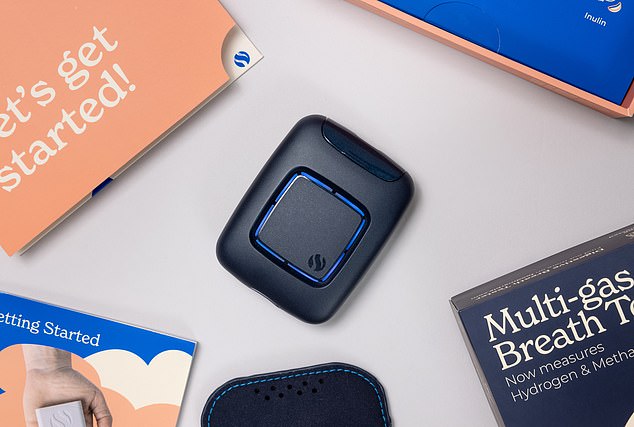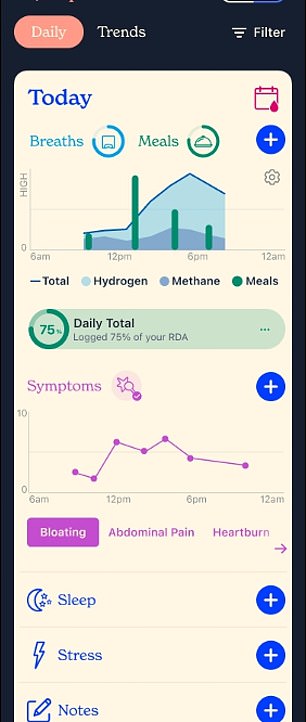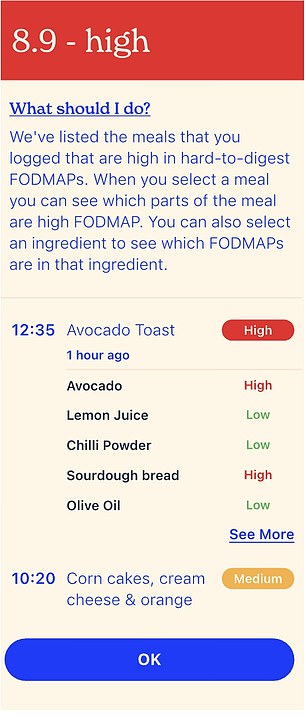Could You Have a Secret Food Intolerance? Breathe into this pocket-sized device and you’ll know (if you’re willing to pay £199…)
The answer to the question of what feels best for you may be hidden in your breath.
So say the makers of a ‘game-changer’ gadget that tells you which foods you might be intolerant to simply in response to being blown into them.
The AIRE2 – created by Dublin-based company FoodMarble – claims to help patients with irritable bowel syndrome (IBS) and those suffering from abdominal pain, bloating or diarrhea.
The pocket-sized device, which costs £199, detects levels of hydrogen and methane in a person’s breath.
Both are produced in abundance by the intestines when it has difficulty digesting certain naturally occurring sugars, such as lactose, fructose and sorbitol.
This allows the device to signal whether the food someone has just eaten is causing digestive problems, according to its makers.
It’s hoped the device, made by Dublin-based company FoodMarble, can help people work out which foods are causing them IBS symptoms and other digestive problems
However, experts have warned that the level of these gases in your breath alone may not give the full picture of what’s behind debilitating stomach problems, and advised people to see their GP to find out what’s behind the symptoms.
An estimated 13 million people in Britain suffer from irritable bowel syndrome (IBS), which causes abdominal pain, bloating and illnesses that come and go over time.
In addition, 10 million Brits suffer from small intestinal bacterial overgrowth (SIBO), which is similar to IBS but affects the small intestine rather than the large one.
The exact causes of the conditions are unknown, but certain foods can trigger a flare-up of symptoms.
However, it can be difficult to figure out who is to blame.
Aonghus Shortt, the company’s CEO, created the device after witnessing his wife Grace’s debilitating IBS symptoms, which made it difficult for her to leave the house.
He said AIR2 is a game-changer now that she knows which foods trigger her.

It works by measuring the amount of hydrogen and methane gas in the intestines. When you breathe into the device from the app, which is synced with your smartphone, you get a score on a scale between zero and ten. High is a ten and low is a zero
How does it work?
Users are asked to breathe into their AIRE2 up to ten times a day – through a small hole on the edge of the device – while recording what they have eaten and any abdominal complaints.
The device then sends a score from zero (low) to 10 (high) to their cellphone for both hydrogen and methane levels.
Hydrogen is produced by the intestines during fermentation – when the intestines break down food that has not been fully absorbed in the stomach or small intestine – which can cause bloating and abdominal pain.
Methane is also produced and can cause constipation.
A high hydrogen level can be a signal that small intestinal bacterial overgrowth (SIBO) is present or that the body is having difficulty digesting carbohydrates and sugars, while a low score means that all is not well with your intestines.
If we score high on methane signals, there is an overgrowth of methanogen in the intestines, which can cause slower digestion and constipation, while at the other end of the scale it is a sign that the intestines are digesting food efficiently.
Dr. Claire Shortt, microbiologist at FoodMarble, said it is the production of these gases in large quantities that causes IBS-like symptoms.
“There will always be some level of gas production happening in your intestines,” said Dr. Shortt.
‘The presence of gas is not a problem. It’s only when the body produces more gas than it can tolerate.’
Although most people don’t experience any discomfort during digestion, in IBS patients these gases can cause pressure in the stomach, similar to “blowing up a balloon,” as well as other signs of digestive problems, she said.
The breakdown of food produces hydrogen and methane throughout the day. Some of it enters the bloodstream and is exhaled through the lungs.
That’s why inhaling the AIRE2 can detect certain gases produced in the intestines and how many there are, and make the connection to which food could be the culprit, claims FoodMarble.
“If you don’t have symptoms, you don’t need to change your diet,” Dr. Shortt said.


By tracking your meals, symptoms, and breath tests in the FoodMarble app, you can spot a pattern of what might be causing your IBS symptoms (left). If you get high results for hydrogen and methane gas in the gut on a breath test, the app can help by showing which foods are easier to digest (right)
How do you know if you have a food intolerance?
Even after testing your breath all day and tracking your meals, it can be difficult to pinpoint what’s causing the symptoms.
To monitor your body’s response to a particular food, the breath tester comes with four sachets of powdered products that are common intolerances for an extra £39.
This includes a packet of lactose, which is found in dairy products such as milk, cream and yoghurt, and a packet of fructose, which is found in fruits and vegetables, as well as corn syrup, explains Dr Shortt.
The kit also contains sorbitol, found in avocados, plums and low-calorie sweeteners, and inulin, found in wheat-containing foods such as bread, pizza and pasta, as well as onions and garlic.
Users are advised to dissolve the powders in water, drink them and then record their hydrogen and methane levels via the AIRE2.
FoodMarble claims this can identify which component is causing IBS-like symptoms.
Dr. Shortt says the device is a quick way to identify problem foods.
Patients with IBS are advised to eat low levels of fermentable oligosaccharides, disaccharides, monosaccharides and polyols, also called the FODMAP diet.
These are four sugars that the body has difficulty digesting and that can cause abdominal complaints in some people with IBS, including diarrhea, cramps and constipation.
However, the FODMAP diet is extremely restrictive, eliminating grains, certain vegetables, fruits, beans, legumes, dairy products, sweeteners, and nuts and seeds.
It can also take months for problem foods to be identified.
Dr. Shortt said the AIRE2 reduces the time it takes to figure out which foods don’t work.
She said: ‘For some people the (FODMAP) diet will take months and others will never come off the diet, so it’s quite a long process with a lot of steps.
‘With the device and the app we have shortened the entire process to about two weeks.’
She added: ‘If someone takes a lactose test and they get a lot of gas after eating lactose and they feel unwell, we would be just as confident about that result as if we were doing it in a hospital.’
For those who discover they have an intolerance when using the AIRE2, the first step is to reduce the serving size of the offending ingredient.
Dr. Shortt says, “Instead of making two scoops of ice cream, have one, or a smaller glass of milk with your meal. A food intolerance is about finding the right portion size, which is different from an allergy (where you have to avoid a food).”
She added: ‘Our aim is to help people with digestive complaints find foods that are well tolerated by their gut, so they can eat a broad, varied diet.
‘Nurturing our gut microbiome is so important to keep us healthy and strong.’
However, experts have warned that a breath test cannot provide a reliable, definitive diagnosis of FODMAP intolerances.
Dr. Duane Mellor, from Aston University in Birmingham, says: ‘Food intolerances go beyond just FODMAPS.
‘Anything that can cause irritation can result in an intolerance, which unlike an allergy does not have an allergic component.’
He warns that testing for “gas production may be one sign of bad fermentation,” but may not be “the whole story.”
Dr. Mellor urges people to see a doctor to rule out bowel cancer and conditions such as celiac disease – both of which can cause digestive problems – if someone is experiencing changes in their poop, stomach pain and bloating.
He added: ‘Perhaps the most useful approach is to use a symptom diary to work out which foods can trigger symptoms.
‘However, you should not do this alone. It is highly recommended that you do this with a registered dietitian so that you do not unnecessarily restrict your diet and reintroduce foods to ensure you have a varied and balanced diet.’
Dr. Gunter Kuhnle, a nutrition scientist at the University of Reading, believes the AIRE2 device could encourage people to unnecessarily restrict their diets and highlight minor problems.
He says: ‘It could make some people aware of small sensations that they would otherwise have ignored.’
